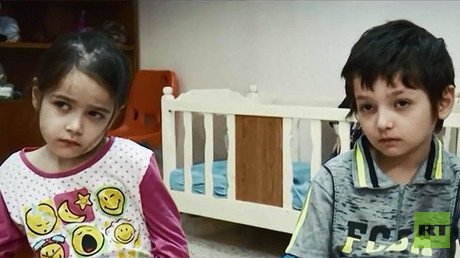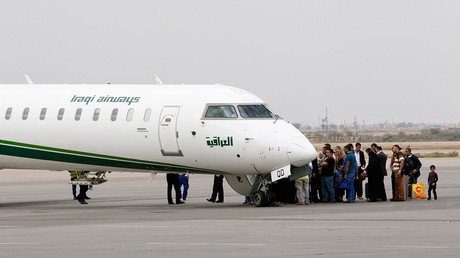‘Didn’t come to kill’: Hundreds of ISIS wives, traumatized kids stranded in UN-backed Iraqi camp
The constant fear of revenge and bleak hopes of returning home are the factors that shape the lives of former wives of Islamic State militants with whom RT met at an Iraqi army camp. Many claim they only followed their terrorist husbands along an ill-fated route.
Hundreds of women, mostly of Turkish, central Asian, Russian and European origin, and the children they bore to Islamic State (IS, formerly ISIS,ISIL) fighters that were killed, captured or forced to flee after government forces liberated the city of Tal Afar have been housed in a UN-sponsored camp in Iraq.
The exact location of the camp and identities of its residents are kept secret by the UN which fears that any information leaks will compromise the site’s security and put hundreds of vulnerable lives at risk.
In exclusive footage from the camp, RT’s Murad Gazdiev reached out to some of the Russian-speaking women who told him they are now cherishing only one dream.
“I want to go home. I’m here by accident. I really want to go home... Please get me out of here,” a widow of an IS widow told Gazdiev, crying.
She said her husband perished during the months-long Iraqi offensive on Mosul earlier this year. The city’s much-awaited recapture spurred the liberation of the nearby ISIS stronghold of Tal Afar, held by militants for three years. As the remaining jihadists surrendered and were taken into custody by the Kurdish militia, their wives were handed over to Iraqi forces.
READ MORE: Sappers’ nightmare: RT films devastation in heavily booby-trapped Tal Afar
The woman claimed her attempts to escape the clutches of IS were in vain.
“It was impossible to get out of here. I tried running away, but nothing worked.”
Many women, who had overcome numerous obstacles and dangers en route to the IS-controlled territory, did not have the slightest idea of what life under the terrorist group will entail, another one confessed.
“Most women here came with their husbands. We didn't come here to fight, or to kill. We came here to live,” she said, adding that once someone arrives at an IS-controlled territory, there is no way back.
“My mother came for me, and they held her too. ISIL wouldn’t let anyone go, even if you needed medical treatment.” she said, adding that she was desperate to leave as well. “Who would want to live there?”
Another woman told Gazdiev it did not occur to her that the road to the jihadist hell was one-way and she would have to be stranded there despite her desire to go back to Ukraine.
“I came here willingly, but I didn't want to stay. I wanted to go back... but I couldn't. I saw the fighting, the war, it hit me psychologically.”
While many IS wives say they now feel lost and scared of the future without their killer husbands, there is also the other side of the story, as some chose to end their lives on the path of terror.
“When we came here, one of the women with us blew herself up. Soldiers started shooting. We ran, and one woman hid under a car. We knew she had heart problems, and I saw her die. That was it,” a woman who witnessed the incident told Gazdiev.
The deceased woman’s three-year-old daughter Maryam remained at the camp. Shortly before her death, the mother said she wished for her daughter to brought back to her grandparents in Russia’s Dagestan.
After years spent with the terrorists, many women and children are deeply traumatized by the daily horrors they have encountered. Scores of children have been orphaned by the war.
The children are now being cared for by UNICEF, with dozens of Russian-speaking children of parents who came to Iraq to join IS stranded in orphanages.
RT has launched its ‘Bring them home’ campaign after relatives recognized some of the children in one of the videos RT filmed in an orphanage in Baghdad. Several children have already been brought back home with help of the Chechen and Dagestani authorities.
The Iraqi camp’s administration is now working to establish the identities of the women, which is a challenge as many lack even basic documents.
However, there are also those who are reluctant to alert their relatives of their whereabouts.
“I don’t think my parents know that I am here, but I told my daughter and asked her not to tell them. My parents are elderly and ill – they could have a heart attack,” a woman said.














